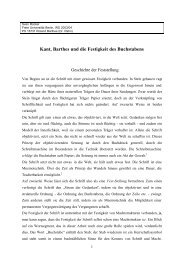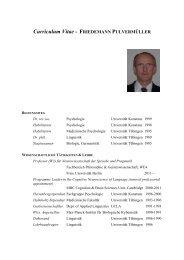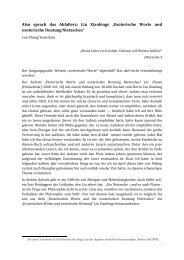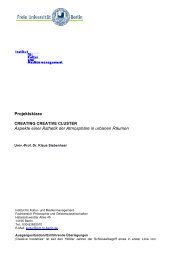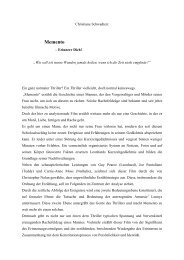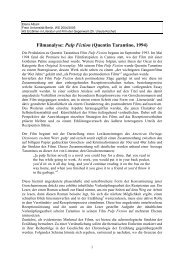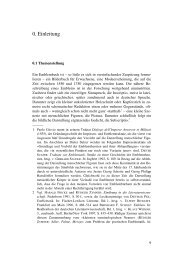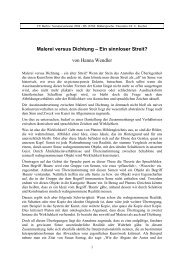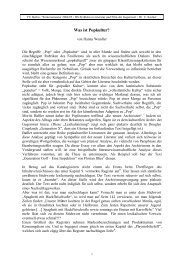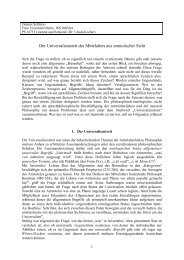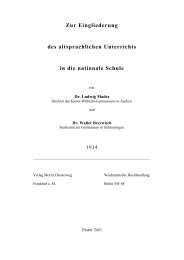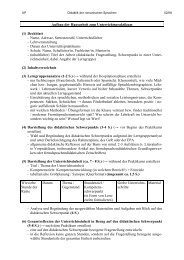nominalizations of french psychological verbs - Fachbereich ...
nominalizations of french psychological verbs - Fachbereich ...
nominalizations of french psychological verbs - Fachbereich ...
You also want an ePaper? Increase the reach of your titles
YUMPU automatically turns print PDFs into web optimized ePapers that Google loves.
248<br />
JUDITH MEINSCHAEFFER<br />
Finally, prepositional phrases headed by pour were said to occur only with<br />
ES-<strong>nominalizations</strong>, but not with EO- <strong>nominalizations</strong>; they can refer to the target<br />
<strong>of</strong> the experience, but not to the experiencing entity. This observation, however,<br />
immediately raises the question why for EO- <strong>nominalizations</strong> the target <strong>of</strong> the<br />
experience cannot be realized in a pour-phrase. What is then the relevant<br />
difference between ES-<strong>verbs</strong> and EO-<strong>verbs</strong> <strong>of</strong> the fasciner-type? One difference<br />
consists in the aspectual type <strong>of</strong> the <strong>verbs</strong>: ES-<strong>verbs</strong> are stative, while EOfasciner-<strong>verbs</strong><br />
are non-stative.<br />
Evidence that stativity is indeed a factor governing the distribution <strong>of</strong> pourphrases<br />
can be gained from the examples in (25), showing that pour-phrases are<br />
grammatical with <strong>nominalizations</strong> <strong>of</strong> the fascination-type, but only under certain<br />
circumstances.<br />
(25) a. la fascination progressive de ce livre / par ce livre<br />
“the growing fascination <strong>of</strong> this book / by this book”<br />
b. l’énorme fascination de ce livre / #par ce livre<br />
“the enormous fascination <strong>of</strong> this book / by this book”<br />
c. une énorme fascination pour ce livre<br />
“an enormous fascination for this book”<br />
As shown by (25a), fascination is a process nominalization (as demonstrated by<br />
the adjective progressif “growing”); it is compatible with a de-phrase or parphrase.<br />
(25b) shows that fascination can have a second interpretation: it can<br />
occur with the degree-modifying adjective énorme “enormous”, which we<br />
assume to modify (stative) qualities, but not (non-stative) processes. Thus, when<br />
fascination has a stative interpretation, as in (25b), the de-phrase is still possible,<br />
but the par-phrase appears to be less felicitous. Importantly, with a stative<br />
interpretation, fascination is compatible also with a pour-phrase, as in (25c). We<br />
therefore propose that the rule in (26) regulates the interpretation <strong>of</strong> pourphrases.<br />
(26) Rule 3: Pour-phrases can refer to the second semantic participant<br />
introduced by PSYCH_RELATION, i.e., to the target <strong>of</strong> experience, <strong>of</strong><br />
stative predicates.<br />
To conclude, this section has shown that the distribution and interpretation<br />
<strong>of</strong> syntactic complements <strong>of</strong> <strong>psychological</strong> <strong>nominalizations</strong> can be derived from<br />
the semantic representations introduced in section 5, by drawing on three<br />
additional rules governing the realization <strong>of</strong> semantic participants by three types<br />
<strong>of</strong> syntactic complements. The lexical representations and the participant-



